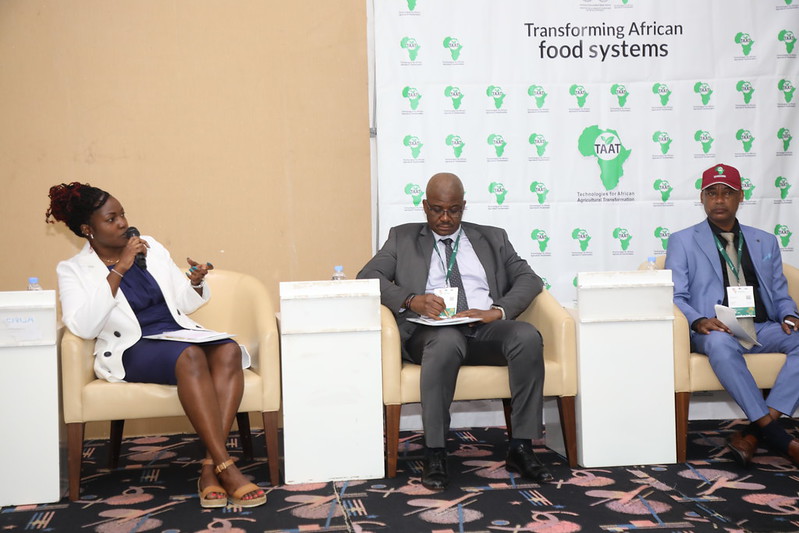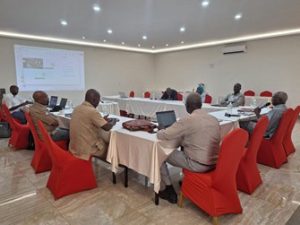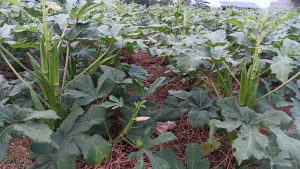Food Systems Transformation: African Cereal and Legume Breeding Consortium to Connect the Private Sector with Major Investments

During the 2024 African Food Systems Forum in Kigali, Rwanda, various stakeholders, including government representatives, private sector leaders, development agencies, and members of the research community, such as seed companies, agronomists, and policymakers, convened to celebrate the launch of the African Cereal and Legume Breeding Consortium (ACLBC).
The breakfast event took place at Lemigo Hotel in Kigali, Rwanda, on September 3, 2024, focusing on the theme “Linking the Private Sector to Large-Scale Investments for Food Systems Transformation.”
This gathering represented a crucial advancement in promoting innovation, investment, and collaboration within cereal and legume breeding. It underscored the potential of public-private partnerships to enhance access to certified seeds, expand agricultural innovations, and drive the transformation of food systems across Africa.
Dr. Martin Fregene, the Director of Agriculture and Agroindustry at the African Development Bank, highlighted the importance of partnerships with the private sector in his keynote address, stressing the necessity to address the persistent issues of food insecurity and inadequate agricultural productivity across Africa
Represented by Mr Innocent Musabyimana, the bank’s Chief Agricultural Technologies Officer, Dr Fregene lauded the consortium’s approach to scaling agricultural technologies to reach millions of farmers.
The African Development Bank, he said, “is excited about the opportunities this consortium presents for scaling innovations, accelerating seed technology adoption, and creating commercial prospects for seed companies across Africa as a whole.”
“The bank’s support to ACLBC is total as the integration of molecular breeding techniques and the emphasis on rapid transfer of seed technologies from the research will undoubtedly have a profound impact on farmers’ access to high-quality seeds, leading to more resilient and resource-efficient farming systems,” Dr Fregene added.
Mr Innocent Namuhoranye, the CEO of Agriseeds Ltd and Chairman of the National Seed Association of Rwanda (NSAR), in a goodwill message, emphasised the importance of strengthening national seed systems and ensuring that local seed companies access improved seed varieties.
Mr Namuhoranye stated that the ACLBC launch ushers Africa to the brink of transformative change as it recognises the pivotal role that innovation and collaboration play in shaping the future of our agricultural sector.
“The formation of ACLBC represents a ground-breaking initiative that builds upon decades of dedication to improving food security and agricultural productivity. By uniting the strengths of public and private sectors, this consortium embodies a forward-thinking approach that promises to enhance our capacity to address the evolving challenges of crop production,” he affirmed.
“The National Seed Association of Rwanda is honoured to be part of this collaborative effort, which aims to leverage seed technologies from the CGIAR centres and foster robust partnerships to drive progress in cereal and legume breeding,” Mr Namuhoranye added.
In a brief presentation, Geoffrey Nsofon, the TAAT Private Sector Engagement Officer, provided an in-depth overview of the African Cereal and Legume Breeding Consortium (ACLBC).
Outlining the history of cereal and legume breeding in Africa, driven by efforts to address food shortages and malnutrition, Nsofon stressed that these efforts have often contended with an ageing population and reliance on traditional crop varieties, many of which are highly susceptible to biotic and abiotic stressors.
Historically, public institutions have overseen crop improvement programs. However, significant strides have been made in recent years in incorporating private sector participation into these efforts.
Nsofon highlighted the formation of breeding consortia, such as the ACLBC, as a critical step towards an integrated approach that draws on decades of plant breeding, agronomic research, and seed system development within Africa.
Established in March 2024 by Technologies for African Agricultural Transformation (TAAT) in partnership with the African Seed Trade Association (AFSTA) and the International Institute of Tropical Agriculture (IITA), the ACLBC seeks to drive innovation and collaboration between the public and private sectors to enhance agricultural productivity, food security, and resilience across Africa by advancing the breeding of cereals and legumes.
Nsofon elaborated on how the consortium fosters sharing genetic resources and advanced breeding techniques to develop superior crop varieties.
Private-sector seed companies are expected to adopt and scale TAAT-vetted seed technologies, investing in crop breeding research, seed multiplication, and distribution channels. This will significantly enhance farmers’ access to improved seed varieties faster than public programmes alone.
He further explained that ACLBC is an incubator for innovation in plant breeding, harnessing cutting-edge techniques, such as molecular breeding. The consortium will accelerate the adoption and scaling of existing seed technologies, providing private seed companies with a competitive edge.
Moreover, the ACLBC creates commercial opportunities for agri-input production and marketing businesses that focus on seeds and related services, he affirmed.
In a panel session moderated by Dr Justin Rakotoarisaona, former AFSTA Secretary General, ACLBC’s mission to enhance agricultural productivity by sharing genetic resources, advanced breeding techniques, and improved seed technologies was discussed.
The panellists included Ms Kate Ojungo Lule, Country Representative for Kenya Seed Company in Rwanda, Dr Yacouba Diallo, AFSTA Secretary General, Dr Solomon Gizaw, Head of the TAAT Clearinghouse, and Dr Ougfaly Badji, the Lead Global Food Security Specialist at the Islamic Development Bank.
The panellists highlighted pathways for ACLBC as an incubator for innovation in plant breeding, using advanced techniques such as molecular breeding to accelerate the development of resilient cereal and legume varieties. The panel also highlighted the critical role of the private sector in scaling these innovations and making certified seeds more accessible to smallholder farmers across Africa.
Dr Simeon Ehui, Director-General of IITA and CGIAR Regional Director for Africa, in his closing remarks, reiterated the consortium’s potential to transform Africa’s agricultural landscape and encouraged ongoing stakeholder collaboration to drive agricultural transformation.
Represented by Dr Chrys Akem, TAAT Program Coordinator, Dr Ehui expressed optimism that ACLBC will drive innovation in Africa’s seed sector by accelerating the adoption of certified seeds.
“This consortium will enhance agricultural productivity, improve food security, and foster resilience in African farming systems by connecting public and private sector stakeholders and prioritising seed multiplication and distribution investments to ensure farmers have timely access to improved crop varieties, Dr Ehui concluded.
The ACLBC inception launch successfully provided a platform to address key challenges in Africa’s food systems and opened further collaboration and investment opportunities.
As the ACLBC moves forward, it will play a pivotal role in accelerating the adoption of seed technologies and shaping the future of Africa’s agricultural development through innovation, scalability, and strengthened partnerships.
Recent Stories
Related Stories
- AFSTA 2025: TAAT advocates Innovative Seed System Models to unlock Opportunities for SMEs
- TAAT and partners elaborate Sweet Potato Roadmap for Rwanda
- TAAT to showcase food systems transformation initiatives at African Food Systems Summit 2024
- RWANDA: TAAT rallies stakeholders on building sustainable seed sector for food systems transformation
- Uganda: TAAT showcases improved and resilient soybean varieties





